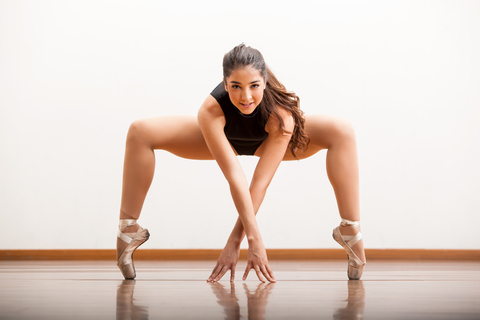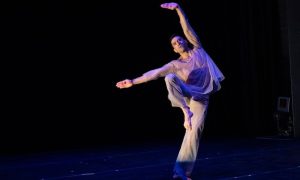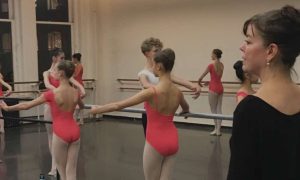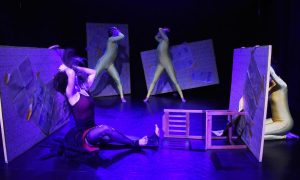By Katherine Moore of Dance Informa.
Here you are! After years and years of dance study you’re finally enrolled in a college dance program and are on your way to becoming a professional. You’ve made it…sort of. Here are some tips and guidelines for getting the most out of your college experience as a dance major.
1. Keep an open mind
For dancers who have been training for most of their lives, the tendency to feel like you already know it all can be strong. After all, you haven’t been training several nights a week and spending your summers inside at dance intensives for nothing, right? While all of those years of training and experiences are certainly a worthwhile part of your dance education, college study can be a totally different ballgame.
Your teachers will come with years of higher education teaching experience in addition to their work as dancers and choreographers, and they will use those skills to challenge you! Don’t be surprised if they ask you to think about your body, technique, or even what dance is in a totally different way. If you’re attending a conservatory-type program, you will probably be pushed in ways you couldn’t have imagined as a dancer, performer, and possibly choreographer. If you’re attending a program at a liberal arts or research institution, you will probably be encouraged to look at dance within a variety of artistic, scientific, social, and cultural perspectives.
Instead of fighting against your teachers with what you “think” you already know about dance, embrace a beginner’s mindset and see what happens! This will give you a much fuller and more expansive dance experience over the next three to four years.
2. Take care of your body
Ever hear of the freshman 15? Yes, this can apply to dancers, too. In your late teens and early twenties, your body can go through big metabolic and hormonal changes that may affect your general health. Combined with the late night pizza parties, drinking, and lack of sleep that often characterize the first few years of a college experience, it can be a challenge to keep your body healthy.
It goes without saying that dancers should be particularly mindful of maintaining a healthy diet, but this can be hard to do. If you’re using food services on campus, try to choose nutritious options whenever possible. If you find those hard to find, college is the perfect time to teach yourself how to cook! Depending on your previous training, this may be the most dancing you’ve ever had to do in your life, so now is not the time to deprive your body of the nutrition and fuel it needs to perform at a high level.
Sleep is perhaps the most underrated tool you have to stay healthy in college. Yes, between dance classes, rehearsals, academic classes, and maybe even a job, you’ll have a lot going on. Lack of sleep can lead to injury, make you more susceptible to contagious illnesses, and lead to mental stress and anxiety. Seek out counseling services on campus if you find that you’re struggling to keep everything in balance. Being a dance major will also mean that you will face critique about your performance from your teachers, so find healthy ways to deal with corrections and advice about your dance training.
As a young adult you might also be making choices about drinking, drugs, and your sexual activity. Just remember that whatever you do with or put into your body will affect your dance performance and ability to get the most out of your program, so be safe and make informed, legal decisions. Think about your future, not just about having fun in the moment.
3. Explore all avenues
While at this moment you might be 100% certain that the only thing you ever want to do is dance, life has a funny way of opening different doors. A dance career requires years of hard work and your college experience may confirm your commitment to dance, or it may transform your dream in other ways. You might find an interest in directing or choreography, stage production, writing, or even physical therapy and dance medicine.
Your college years are a unique time when you get to explore lots of interests, so if something piques your attention, go for it! If time and money permit, maybe you can even study abroad and explore dance in a foreign country. Be open to learning how dance can impact other areas of your life, and remember that your grades in academic classes do count!
4. Plan for the future
Once you’re in the college bubble, it can be easy to forget that there is an outside world you’ll have to re-enter after you graduate. Your teachers can be some your greatest assets when planning for life after graduation. Even as early as your freshman year, sit down with mentors and advisers to discuss what you want out of your program and where you hope to be at the end of it. They may recommend summer programs or internships to help you meet your goals, and they might be able to connect you with professionals in the field.
If your school has visiting guest artists who have their own dance companies, be sure to audition for their performances and sign up for their classes. They could be your future employer! Take advantage of career and counseling services, workshops, and opportunities to build relationships with peers and teachers. The dance world is actually quite small, and you never know who might want to hire you someday down the road.
Photo (top): © Antoniodiaz | Dreamstime.com














Pingback: What You Need to Know as a Freshman Dance Major - Dance Life